Alexander Gerst was among the six people selected last week for training as the European Space Agency's next batch of astronauts. A 33-year-old German geophysicist, Gerst will prepare to travel to space in September.
Deutsche Welle: Congratulations on being selected as one of the European Space Agency's astronauts. What was your first reaction when you got the news?
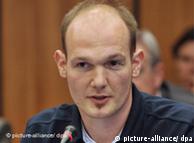 Bildunterschrift: Großansicht des Bildes mit der Bildunterschrift: Gerst said he is not afraid of being shot into space
Bildunterschrift: Großansicht des Bildes mit der Bildunterschrift: Gerst said he is not afraid of being shot into spaceAlexander Gerst: It was the greatest feeling I could imagine at that time. It was obviously a great dream of mine that I'd had for most of my life that was fulfilled at that moment. It's hard to describe.
You are basically living a dream?
Yes, I was. For me it is a long-standing dream to explore our planet and the space around it. I was always a very curious person. As a child I turned over every stone and looked behind every tree and I liked to explore. For me now, after becoming a scientist, which allows me to do those things down here on Earth, this new job offers me the chance to do the same in space which is the ultimate way for me to do science and exploration.
Thousands of people sent in applications to become one of Europe's astronauts. How difficult was the selection process?
Some of the tests were, obviously, quite tough - even for a successful candidate, they weren't easy at all. I never went out of a test saying, "I've got this one in the bag." I always came out with mixed feelings. I said, "Well, I didn't do so bad, but I also wasn't really good at it." In the end it worked out, but it's hard to tell. Some of the tests felt quite easy and natural and some others were very tough.
What do you think it was that singled you out from the thousands of others during the grueling, year-long process for the role of European astronaut?
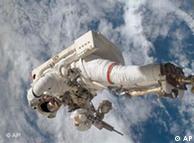 Bildunterschrift: Großansicht des Bildes mit der Bildunterschrift: Years of training are necessary before stepping out into space
Bildunterschrift: Großansicht des Bildes mit der Bildunterschrift: Years of training are necessary before stepping out into spaceI'm actually not completely sure. I think it might be a little of everything. Certainly there was some luck involved. I considered myself lucky that my body was good enough to pass the medical test, which I'm not fully responsible for.
A very important component is fascination - fascination for the space program, fascination for the job. That fascination leads to persistence to follow through with all the tests and all the preparations and to not give up on the way.
Another very important criterion is working in teams. I've shown through experiences I've had in Antarctica that I can perform in a team, and many others have done so as well, and I think that's a very important criterion for the European Space Agency.
You are a geophysicist, four of the other people chosen are pilots and the fifth works with guidance systems. What role do you think your position as a scientist plays?
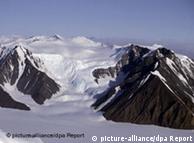 Bildunterschrift: Großansicht des Bildes mit der Bildunterschrift: Gerst conducted some of his research in Antarctica
Bildunterschrift: Großansicht des Bildes mit der Bildunterschrift: Gerst conducted some of his research in AntarcticaEvery good team has to be a diverse one. The charter of European astronauts says "unity through diversity," and that's the motto of all of Europe in my opinion. Therefore, I think the European Space Agency did well by choosing a diverse team with different backgrounds and experiences - only then can everyone contribute their experience to the bigger team experience.
Are you worried about what the future now holds for you?
I wouldn't call it worried, but it's certainly a challenge. I've got a lot of press attention, but I don't consider myself someone who has done a lot. The European Space Agency puts a huge amount of trust in me and I don't want to disappoint. It's a challenge and I'm aware that I would like to perform as people expect.
Does the prospect of being strapped into a rocket and blasted into space frighten you?
No, not at all. I'm fascinated by that prospect.
I don't think fear is a helpful emotion in that respect. I can't speak as an astronaut, of course, since I haven't flown yet, but as a scientist who has worked on active volcanoes I know that fear makes us irrational, which can sometimes be dangerous. That is not a helpful feeling, but what is very important, at the same time, is to have respect for the risks involved - to minimize them and be aware of them. So respect, yes, but fear, no.
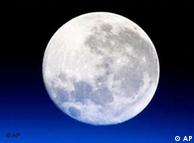 Bildunterschrift: Großansicht des Bildes mit der Bildunterschrift: The Moon is a still a far-off goal for the new batch of future astronauts
Bildunterschrift: Großansicht des Bildes mit der Bildunterschrift: The Moon is a still a far-off goal for the new batch of future astronautsTraining for future missions to the International Space Station begins in September, and there is also a chance you could go to the Moon in collaboration with NASA and other space agencies. What will you, personally, be looking forward to?
The Moon program is quite far away, so I can't put myself in any role there because it's certainly not clear who is going to be on that mission. I would personally love to be there. I know that the Moon is full of treasures for us.
I would rather concentrate now on closer things, like my training and, after that, flights to the International Space Station.
There is a lot of science to be done there that is so important for us down here on Earth. In economic and scientific ways there is very important research to be done up there and that is what I would like to concentrate on most.
 Left: Julie Payette
Left: Julie Payette“I remembered guys going into a big white rocket…then flying to the moon, then on the moon they would drive a lunar jeep,” she said. “I wanted to do that, but it didn’t seem right. I was a girl in the early ’70s; spoke only French at the time. There was no such thing as a Canadian astronaut…and space travel was still for other people, other nations, so I had the wrong nationality. It didn’t matter – when you’re 10 years old and there’s something fascinating to do, you dream about it.
“Why do we lose that – that idea that we can accomplish something that maybe other people tell us we can’t?” she asked. “You have to keep for the rest of your life. Dare to dream.”
Walter Tholen, interim dean of the Faculty of Science & Engineering, said it was particularly appropriate that Payette address the graduates of the classes of 2010. In speaking about York’s many decades as a “major contributor to Canada’s research in space science and instrumentation,” he said Payette’s remarks would surely help the graduating students “connect their alma mater with space science and exploration.” In his introductory statement, Michael De Robertis, associate dean (research & Faculty affairs) in the Faculty of Science & Engineering, said Payette's gaze was always "firmly fixed upwards".
Payette also spoke about her own sense of responsibility, as one of a privileged few who have seen the earth from space, to continue dreaming of how we can protect our planet. “I’ve had this opportunity and the only thing I can think of is that the fact that there is only one place that we can live and this place we share, us all. And whether or not we have borders and differences, and different ways and different cultures, we are indeed sharing a single world.”
 Right: Tholen shares a light moment with Payette following her remarks
Right: Tholen shares a light moment with Payette following her remarksDuring her remarks, Payette exhorted graduates to “be involved, be active, don’t settle for mediocrity” and spoke about their responsibility as graduates of a mighty institution, to use their education to make important decisions for the future betterment of their community.
“We are a very rich and very resourceful country, a beautiful one and a grand one – and oh, by the way, it takes nine minutes to cross it in the space shuttle – but it’s still big,” said Payette. “When you do make those decisions, that you continue to look out for people who have less and you continue to use what you have more all the time.
“Aim high, dare to dream and – trust me on this one – the sky is not the limit.”
u do not need to be a Nobel Prize winner in astronomy in order to imagine that the sky is the limit for your flights of fancy in your mind (if not in the "Discovery" shuttle). However, in truth the sky which we talk about is just an imaginary surface, beyond which there is immense space enough to gobble up decillions of duodecillions (actually even this is a very small number) of solar systems and still be hungry and have lots more space left in its "stomach".
Is the Sky Really the Limit?
As already hinted in the previous section, sky is just an imaginary dome wherein the stars, sun and moon seem to move against its background. It is simply visible to the human eye due to the phenomenon of the scattering of the light of the sun. There are innumerable treatises present on the philosophy of space ranging from world famous thinkers and scientists including but not limited to Leibniz, Sir Newton, Kant and Euclid. But I will not interrupt your philosophical musings with their brain-crunching technicalities and mathematical analysis. It is interesting to note that the concepts of space have changed with time and Dr Einstein showed that space is not absolute as thought earlier but is a relative construct known as spacetime.
What Objects are there in Space?
To give a very simple answer to the above question, it can be said that everything and everyone in this universe lies within this space and this is true as well. But if you want to know about other objects than which you are familiar with, the space is full of a variety of celestial bodies.
Every one of us surely has the experience of traveling in heavy traffic some day or the other. It needs constantly alert driver and lots of practice to drive safety though the traffic but just see how intelligently nature governs the bodies traveling in space, although accidents of astronomical proportions do occur even at this level.
The objects which are found in space range from planets, stars, satellites, asteroids, black-holes, solar dust to name a few and each of them requires a separate article for detailed description.
Of course apart from the above mentioned objects, one question that has troubled mankind since the early days is whether apart from these inanimate objects, there do exist some intelligent life-forms in space like human beings. Speaking in the strictly scientific sense there has been not satisfactory proof about the same but reason seems to suggest that it is highly unlikely that such huge space has only got but one planet where life should develop. Of course there are several attempts going on across the globe by various space agencies to ensure that they do not leave any leaf unturned in search of extra terrestrial life. This may seem a matter of science fiction rather than a fact in the current era, but who knows tomorrow you might be walking with an alien eating your favourite ice-cream.
Every one of us surely has the experience of traveling in heavy traffic some day or the other. It needs constantly alert driver and lots of practice to drive safety though the traffic but just see how intelligently nature governs the bodies traveling in space, although accidents of astronomical proportions do occur even at this level.
The objects which are found in space range from planets, stars, satellites, asteroids, black-holes, solar dust to name a few and each of them requires a separate article for detailed description.
Of course apart from the above mentioned objects, one question that has troubled mankind since the early days is whether apart from these inanimate objects, there do exist some intelligent life-forms in space like human beings. Speaking in the strictly scientific sense there has been not satisfactory proof about the same but reason seems to suggest that it is highly unlikely that such huge space has only got but one planet where life should develop. Of course there are several attempts going on across the globe by various space agencies to ensure that they do not leave any leaf unturned in search of extra terrestrial life. This may seem a matter of science fiction rather than a fact in the current era, but who knows tomorrow you might be walking with an alien eating your favourite ice-cream.
Read more: http://www.brighthub.com/science/space/articles/3057.aspx#ixzz1DRpv0W8r
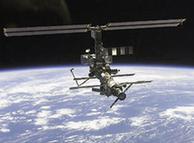
No comments:
Post a Comment